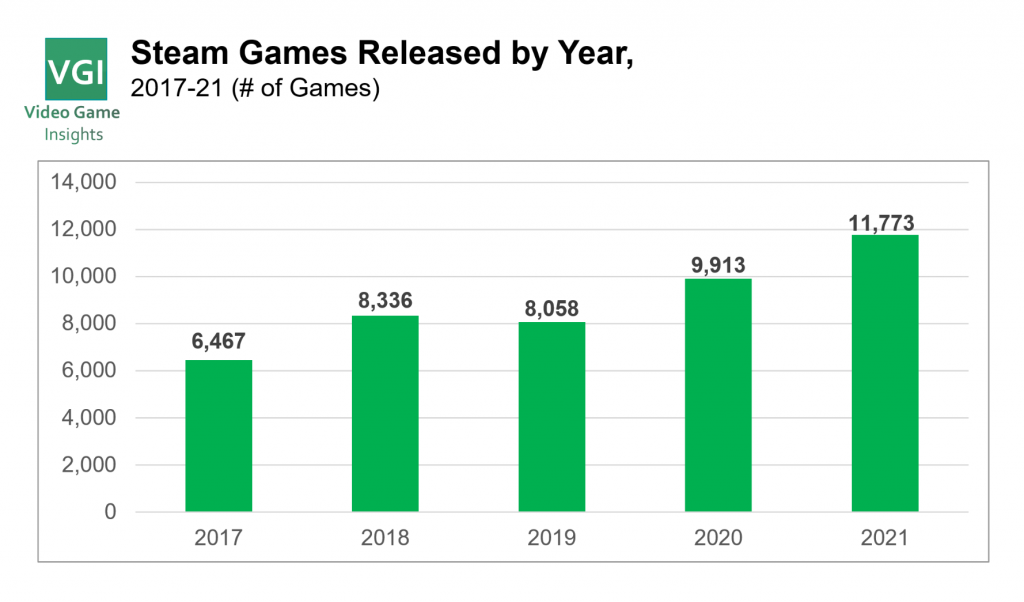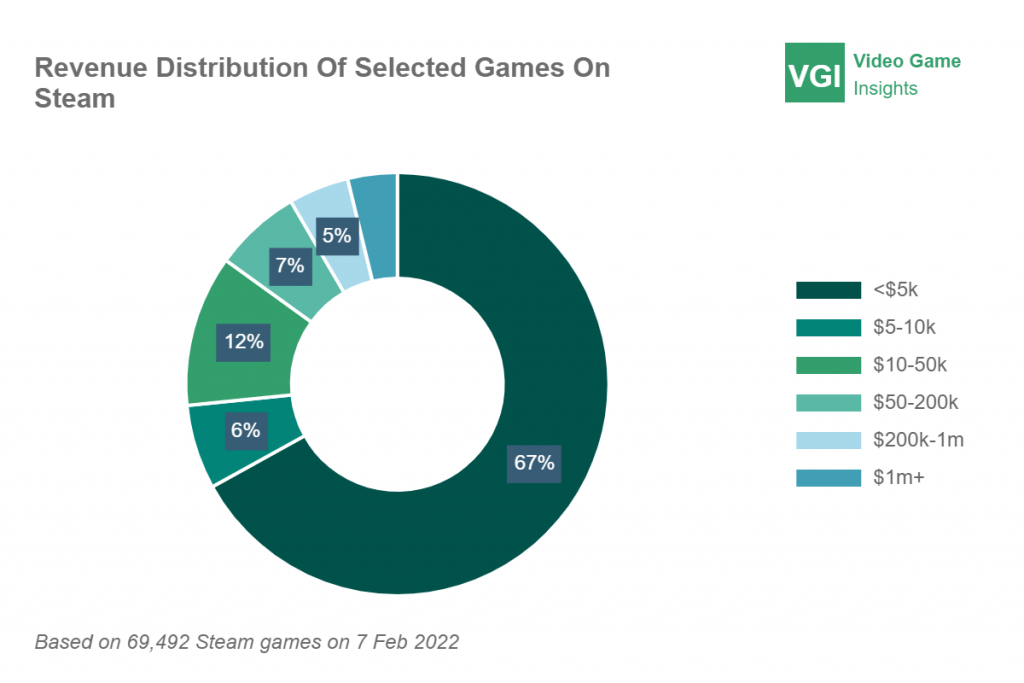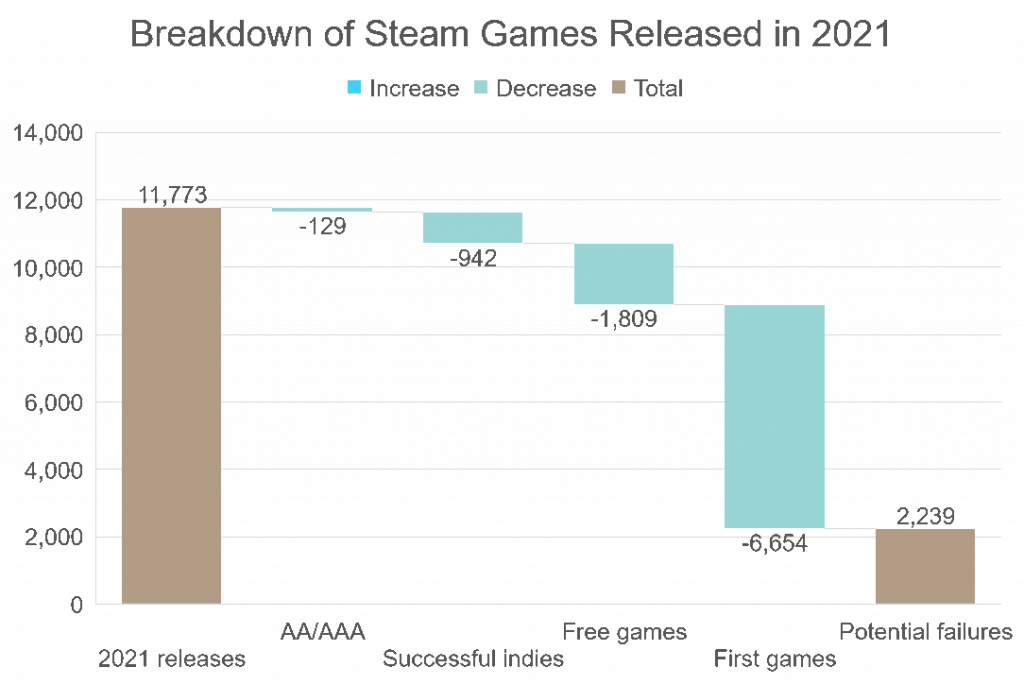Statement: There are too many video games
Okay, so this whole argument started because of a graph we posted.

The number of games released every year looks pretty high. It’s doubled since the Steam greenlight was ended in 2017. Yes, that’s over 30 games released on Steam every day. That’s only on Steam. I’ve got no doubt that the number of mobile games released is even higher.
Verdict: There’s an increasing number of games released every year and the total number is probably higher than you would have thought. Is it too much though? It is hard to answer such an ambiguous statement without digging further.
Statement: Indie developers don’t make any money
Okay, we might be at fault here as well. We’ve released a lot of statistics in the recent years on how little these games actually make and how most of these games hardly get any players to play them. This infographic about indie developer revenues on Steam that we released is probably the best summary of that.
You can check out the distributions yourself on our Steam Analytics page, but I’ve pulled a summary for you here. If you look at all of the c. 70k games on Steam, 67% of them have made less than $5k.

If you take the 30% Steam cut and taxes off, you’re left with just about enough money to pay for the pizzas that kept you going during the development of the game.
So yes, most games on Steam don’t make much money. That DOES NOT mean that most indie developers make <$5k. It also does not mean most games that were intended to make money make less than $5k. I’ll explain in the next section.
Verdict: Yes, most games on Steam make very little money. However, these statistics alone don’t prove developers make little to no money. It also says nothing about the intent when creating these games.
Implied statement: Games are businesses and their sole purpose is to maximise profits
Not all games are made with the sole intention to make money. Let’s leave the creative expression and artists making art for the sake of art aside. Though, that too is important.
Students make games to learn in a practical way. Game industry veterans make prototypes to test out new ideas. People make games for their portfolio to show big studios what they’re capable of. Making games is also fun. I’m making a game right now just because I find it interesting. It is similar to why I’m playing games. I enjoy it and it’s different to my day job. I’m relaxing while doing it. So, it seems like there are a lot of valid reasons why one could still be happy with the results even if the game doesn’t sell a lot.
That’s all fine and everyone can make these statements, but what does the data say? Let’s break down these 11.7k games made in 2021.

Out of the 11.7k games released in 2021, 129 were by large studios. Another almost 1,000 games were indie games that made at least $50k in gross profit in their first year, which I’ve categorised as successes.
1,800 games were free games and 6.7k games were the first game to have been released by the developer. That’s an interesting sub-section. I hypothesise that a lot of these people are either learning to make games or making games for their portfolios. They were not made with the intention to get rich or have 1000s of people play them. That’s fine.
That leaves us with another c. 2k games that didn’t do well. They weren’t the first game from that developer and, at first sight, seem to potentially have failed. So just under 20% of games released in 2021 have been potentially unsuccessful vs their original goal. But we don’t know for sure.
Verdict: There are many valid reasons for making a game. The success of a game doesn’t have to be financial. If that helps you land a dream job, then the released game was a success, even if it sold 20 units.
Statement: Game development is less helpful to the society than being a charity worker / pot hole fixer / surgeon, so we should all do something more useful instead
If we’re trying to maximise the full potential efficiency of society here, why are we starting with the 10,000 game developers who made a game on Steam last year rather than the 2bn people that played games last year? I’d argue what they’re doing is a bigger collective “waste”.
Also, let’s be real. In the coming decades we’ll have more free time than ever before. 4-day work weeks, flexible working, automation of roles, universal salaries – it’s all coming sooner or later. You can do good AND work on your passion.
Verdict: Yes, you can almost always be doing something that would result in greater good than whatever it is you’re doing now.
Be mindful of how you use your time. But if you’re passionate about game dev, make games! You can also do charity work and cure cancer, but do that by cutting your Netflix and TikTok time first. People making games or any other form of art really isn’t the biggest waste of societal potential.
Make more games, not less!
A lot of people making games is not the issue. Yes, you shouldn’t asset-flip another game in the hopes of making millions with it. However, there are so many reasons why you should make a game, even if it’s not a financial success.
And if you do want to make a successful game, do your damn research. Pick a good genre, pick popular features, think who your audience will be, ask them how much they like the idea, see what other games like that have done well or not, see their reviews. Game development is more than coding and drawing. Get good at the full process.
Here’s to another 10,000 games released in 2022!